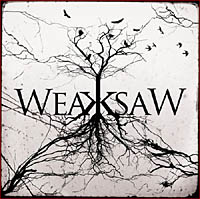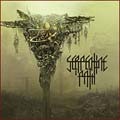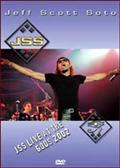WEAKSAW (FRA) - Weaksaw (2012)

Label : Klonosphere
Sortie du Scud : 20 janvier 2012
Pays : France
Genre : Thrash / Death Metal moderne
Type : Album
Playtime : 10 Titres - 42 Mins
Ces derniers mois, la Klonosphere, le label dirigé par Guillaume Bernard (KLONE), a considérablement élargi son catalogue en dénichant de jeunes formations françaises, à l’image de STEP IN FLUID, HYPNO5E ou encore de JENX. Les Montpelliérains de WEAKSAW font ainsi partie des récentes découvertes du label et ont pu sortir leur premier véritable album en ce début d’année, après un EP publié en 2009.
Une description d’« Oil Slick », premier morceau à part entière après l’intro « Weaksaw », suffirait presque à rendre compte de l’ensemble de l’album. En effet ce titre réunit tous les ingrédients que WEAKSAW exploite tout au long de ce premier opus : rythmiques syncopées soutenues par une double pédale, voix écorchée, accélérations évoquant LAMB OF GOD, le tout étant agrémenté de leads de guitares plus aériens. La musique des Montpelliérains se veut résolument moderne, dans la lignée d’un MESHUGGAH ou de la scène Djent. Cela se ressent dans la production, elle aussi très actuelle, avec un son très propre mais qui donne un aspect légèrement artificiel à l’ensemble.
Les morceaux suivants s’enchainent sans véritable rupture et s’avèrent plutôt efficace, les riffs matraqués font leur petit effet et le tout est relativement bien réalisé. Malheureusement, l’enthousiasme retombe progressivement au fil de l’écoute. En effet, WEAKSAW ne change quasiment pas de recette au cours du disque et le tout se révèle bien linéaire. Les compositions peinent à vraiment décoller et aucun titre ne se détache véritablement du lot. Les trop rares tentatives de variation ont de plus tendance à tomber à l’eau, à l’image de « Dystopian City », sur lequel le combo cherche à ralentir le tempo et à développer un aspect légèrement plus atmosphérique. Le résultat s’avère cependant peu convaincant, avec notamment des chœurs plutôt ratés. Ce premier effort souffre également d’un cruel manque d’originalité, WEAKSAW peine à se détacher des influences citées plus haut, en particulier de celle de MESHUGGAH. Certains riffs sentent ainsi le réchauffé, notamment en raison de l’usage quasi systématique de la combinaison rythmique syncopée et double pédale.
Cela est d’autant plus regrettable que le potentiel semble être là, les Montpelliérains font preuve d’une véritable aisance technique et sont capables de proposer des compositions particulièrement efficaces, à l’image de « Rattlesnake Redemption », sur laquelle on retrouve l’unique solo du disque. On retiendra également quelques riffs plus percutants que les autres, comme le riff principal d’« Advertising », ou celui de « The Alder Fall ».
Ainsi, bien que ce premier opus soit plutôt bien réalisé, celui-ci s’avère trop linéaire et trop peu original pour permettre aux Sudistes de véritablement se distinguer. D’autant plus que les nouvelles formations officiant dans le même genre sont particulièrement nombreuses. Cependant, le combo affiche également d’indéniables qualités, on attendra donc un éventuel deuxième effort pour se prononcer définitivement.
Ajouté : Mercredi 17 Octobre 2012
Chroniqueur : Julien
Score :   
Lien en relation: Weaksaw Website
Hits: 9100
|













